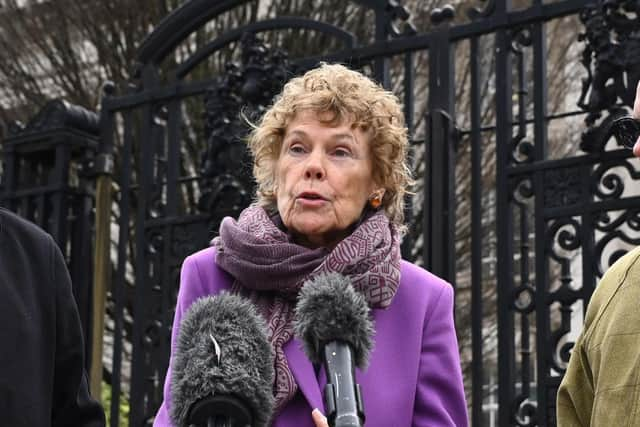Kate Hoey: The Belfast Agreement, with its fatal deception, is finished
and live on Freeview channel 276
In 1998 I was a Labour MP, and I travelled to Northern Ireland to campaign along with David Trimble for the Belfast Agreement.
Despite my many misgivings about the agreement, I wanted (and still want) to see peace and stability in my home country.
Advertisement
Hide AdAdvertisement
Hide AdI believed – based on the promises made to the pro-Union community and MPs – that central to the agreement was the principle of consent.


Put simply; Northern Ireland’s constitutional status within the Union could not be altered without the consent of a majority of its citizens. It was on this basis, and this basis alone, I – and many others – were prepared to campaign for the agreement.
I should point out that the principle of consent related to Northern Ireland’s relationship vis-à-vis the Union, it had nothing to do with the UK’s external relationships.
As such the UK leaving the EU plainly wasn’t within its terms – but NI being subjugated within the Union plainly should have been.
Advertisement
Hide AdAdvertisement
Hide AdHowever, the Court of Appeal judgment yesterday has confirmed that we were all deceived. The core basis for unionist support for the agreement – the principle of consent – does not in fact protect the substance of Northern Ireland’s place within the Union at all, but rather only directs itself to the final formal handover of sovereignty. When it comes to NI’s place within the Union, you can change everything but the last thing. The last thing being simply the final formal handing over of sovereignty.
If you had told me, or I suspect Lord Trimble, that the principle of consent was in fact merely symbolic and thus law-making and judicial powers over Northern Ireland could be handed to a foreign power, and the very fundamental basis of the Union itself – the Acts of Union – could be, in the lady chief justice’s own words “subjugated”, then there is no way that I would have ever supported the Belfast Agreement in the first place.
It is trite to point out that if law-making and judicial power could be handed to Brussels without offending the principle of consent, then so long as Northern Ireland remained technically within UK territory, law-making powers could equally be devolved to Dublin.
No self-respecting unionist can ever again operate the institutions of the Belfast Agreement. And nor can any of us pretend we are blind to the fatal deception at its heart.
It is finished.
Advertisement
Hide AdAdvertisement
Hide AdJim Allister QC: The appeal court has confirmed that the Northern Ireland Protocol dismantles the Union
Ruth Dudley Edwards: Sinn Fein cannot erase its record of hostility towards Nato
——— ———
A message from the Editor:
Advertisement
Hide AdAdvertisement
Hide AdThank you for reading this story on our website. While I have your attention, I also have an important request to make of you.
With the coronavirus lockdowns having had a major impact on many of our advertisers — and consequently the revenue we receive — we are more reliant than ever on you taking out a digital subscription.
Subscribe to newsletter.co.uk and enjoy unlimited access to the best Northern Ireland and UK news and information online and on our app. With a digital subscription, you can read more than 5 articles, see fewer ads, enjoy faster load times, and get access to exclusive newsletters and content.
Visit
now to sign up.
Our journalism costs money and we rely on advertising, print and digital revenues to help to support them. By supporting us, we are able to support you in providing trusted, fact-checked content for this website.
Ben Lowry, Editor